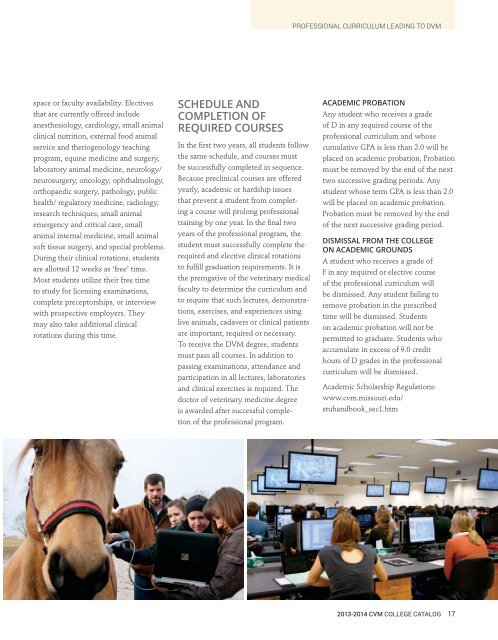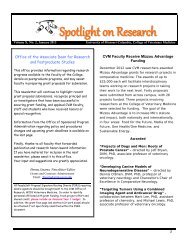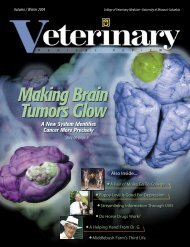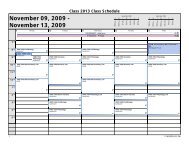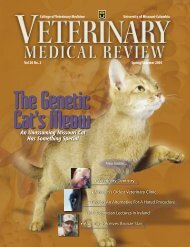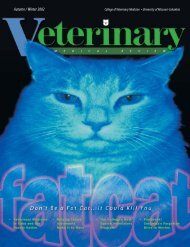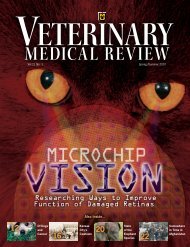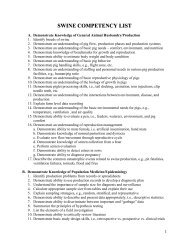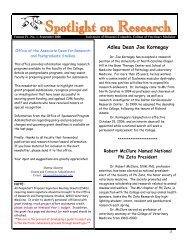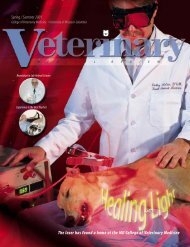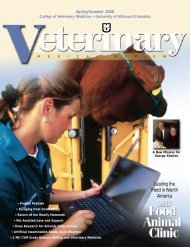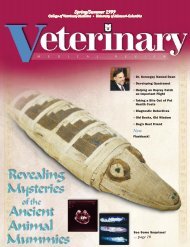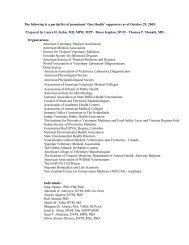2013/2014 Course Catalog - University of Missouri - College of ...
2013/2014 Course Catalog - University of Missouri - College of ...
2013/2014 Course Catalog - University of Missouri - College of ...
You also want an ePaper? Increase the reach of your titles
YUMPU automatically turns print PDFs into web optimized ePapers that Google loves.
PROFESSIONAL CURRICULUM LEADINg to DVMspace or faculty availability. Electivesthat are currently <strong>of</strong>fered includeanesthesiology, cardiology, small animalclinical nutrition, external food animalservice and theriogenology teachingprogram, equine medicine and surgery,laboratory animal medicine, neurology/neurosurgery, oncology, ophthalmology,orthopaedic surgery, pathology, publichealth/ regulatory medicine, radiology,research techniques, small animalemergency and critical care, smallanimal internal medicine, small animals<strong>of</strong>t tissue surgery, and special problems.During their clinical rotations, studentsare allotted 12 weeks as ‘free’ time.Most students utilize their free timeto study for licensing examinations,complete preceptorships, or interviewwith prospective employers. Theymay also take additional clinicalrotations during this time.Schedule andCompletion <strong>of</strong>Required <strong>Course</strong>sIn the first two years, all students followthe same schedule, and courses mustbe successfully completed in sequence.Because preclinical courses are <strong>of</strong>feredyearly, academic or hardship issuesthat prevent a student from completinga course will prolong pr<strong>of</strong>essionaltraining by one year. In the final twoyears <strong>of</strong> the pr<strong>of</strong>essional program, thestudent must successfully complete therequired and elective clinical rotationsto fulfill graduation requirements. It isthe prerogative <strong>of</strong> the veterinary medicalfaculty to determine the curriculum andto require that such lectures, demonstrations,exercises, and experiences usinglive animals, cadavers or clinical patientsare important, required or necessary.To receive the DVM degree, studentsmust pass all courses. In addition topassing examinations, attendance andparticipation in all lectures, laboratoriesand clinical exercises is required. Thedoctor <strong>of</strong> veterinary medicine degreeis awarded after successful completion<strong>of</strong> the pr<strong>of</strong>essional program.Academic ProbationAny student who receives a grade<strong>of</strong> D in any required course <strong>of</strong> thepr<strong>of</strong>essional curriculum and whosecumulative GPA is less than 2.0 will beplaced on academic probation. Probationmust be removed by the end <strong>of</strong> the nexttwo successive grading periods. Anystudent whose term GPA is less than 2.0will be placed on academic probation.Probation must be removed by the end<strong>of</strong> the next successive grading period.Dismissal from the <strong>College</strong>on Academic GroundsA student who receives a grade <strong>of</strong>F in any required or elective course<strong>of</strong> the pr<strong>of</strong>essional curriculum willbe dismissed. Any student failing toremove probation in the prescribedtime will be dismissed. Studentson academic probation will not bepermitted to graduate. Students whoaccumulate in excess <strong>of</strong> 9.0 credithours <strong>of</strong> D grades in the pr<strong>of</strong>essionalcurriculum will be dismissed.Academic Scholarship Regulations:www.cvm.missouri.edu/stuhandbook_sec1.htm<strong>2013</strong>-<strong>2014</strong> CVM COLLEGE CATALOG 17


